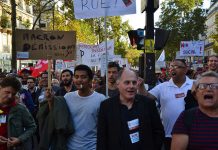Poverty is seen often as lack of income. But people are poor not only because they lack money or services, but because of discrimination, state repression, corruption, insecurity and violence. The poor have no voice. They cannot hold the powerful to account. These are human rights problems.
One poor woman dies every 90 seconds somewhere in the world giving birth or due to pregnancy related reasons. Most governments say safe motherhood is a problem of capacity and resources for good health care. Yes, but it is also about the disempowered status of women.
Who decides when a woman should marry, when she should conceive, how many children she should have, how she should space them, when she should seek medical care? And most importantly, who decides how much of the national budget should be spent on maternal health, where clinics should be built and how they should serve women?
One billion people live in slums today. That number will double by 2030. Yet very little attention is being given to improving slum conditions. Crime is rife in slums. There is no security of tenure for slum dwellers. Your landlord can evict you without any due process or compensation. You pay an extortionate price for water or electricity from private sources because slums are illegal, so the local authority does not provide any services and police does not protect you.
Those who live in slums provide the essential labor to make cities functions but are left without any rights themselves. If they protest they are brutally suppressed.
These examples show that poverty is about the abuse of economic and social rights, such as the right to health or water, as well as civil and political rights, such as freedom of expression and the right to vote. Unless human rights are respected, development will not succeed.
Yet, far too many people still believe that civil and political rights hinder development and point to China’s impressive growth. But if China is a special case that succeeded, far too many others have failed, e.g. Burma, North Korea, Chad, Equatorial Guinea, Zaire, etc. Besides, China’s authoritarianism led to some disastrous outcomes, such as the Great Famine.
Research shows that development does best where the poor are in control, where they can engage with political and decision-making processes, and hold their governments accountable.
Many countries – including the US – do not accept economic and social rights as rights but only as needs to be provided by market. When education or health is provided by the market, poor people cannot afford to pay and are deprived. Or if they are given it as charity and not a right, they are robbed of dignity and disempowered.
Many say economic growth will wipe out poverty. Growth is important because it creates opportunities. But growth increases inequality and marginalizes the poor. It does not deal with existing discrimination in society which often means that the poor cannot access the opportunities that growth creates. Building schools alone will not ensure that girls get education. Increasing agricultural production does not give security of tenure to landless peasants.
There must be a sea change in the way in which development is carried out. Successful development is not just about enrichment – it is about the empowerment of the poor and the accountability of the powerful. Human rights must become an essential part of all development strategies. The struggle to end poverty is a struggle for freedom, justice and dignity.







